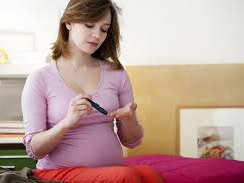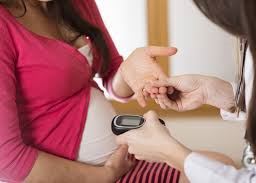Gestational Diabetes
 Pregnancy women are screened between the 24th – 26th week of their pregnancy to see if they have gestational diabetes. Sometimes a woman will actually have type 2 diabetes that has been diagnosed as a result of the screening but usually blood glucose levels return to normal after their baby is born.
Pregnancy women are screened between the 24th – 26th week of their pregnancy to see if they have gestational diabetes. Sometimes a woman will actually have type 2 diabetes that has been diagnosed as a result of the screening but usually blood glucose levels return to normal after their baby is born.
It is important for women with gestational diabetes to monitor their blood glucose levels. This is so the levels can be kept as near as normal as possible with a healthy diet, activity that is appropriate for their pregnancy and management of stress. If the levels can’t be controlled this way insulin injections are required.
Jayne Lehmann provides education and support to women with gestational diabetes referred by their obstetrician or doctor in three locations.
Women attending their first session receive:
 An explanation is provided on what gestational diabetes is, potential effect on mother and baby and how to treat it with diet, exercise and stress management.
An explanation is provided on what gestational diabetes is, potential effect on mother and baby and how to treat it with diet, exercise and stress management.- A blood glucose meter and log book are provided together with education in their use and how to get supplies.
- Safe sharps disposal
- Target blood glucose levels are provided and times of testing.
- What to expect after baby is born
- The National Diabetes Services Scheme forms are signed and explained.
- Summary letter provided for the woman and referring doctor.
Some women need to commence insulin to treat their diabetes. This is because they cannot take diabetes tablets as they have not been proven safe in pregnancy.
Insulin initiation session includes:
- Review of blood glucose monitoring technique
- Education in the use of the insulin device, storage, insulin action, how to administer, rotation of sites and disposal of sharps
- Identification, treatment and prevention of hypoglycaemia
- NDSS form signed to get insulin pen needles from the NDSS
- Counselling if required.

